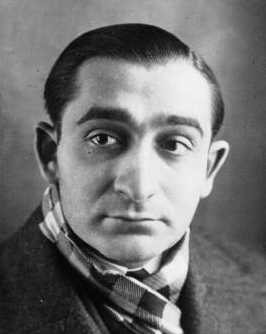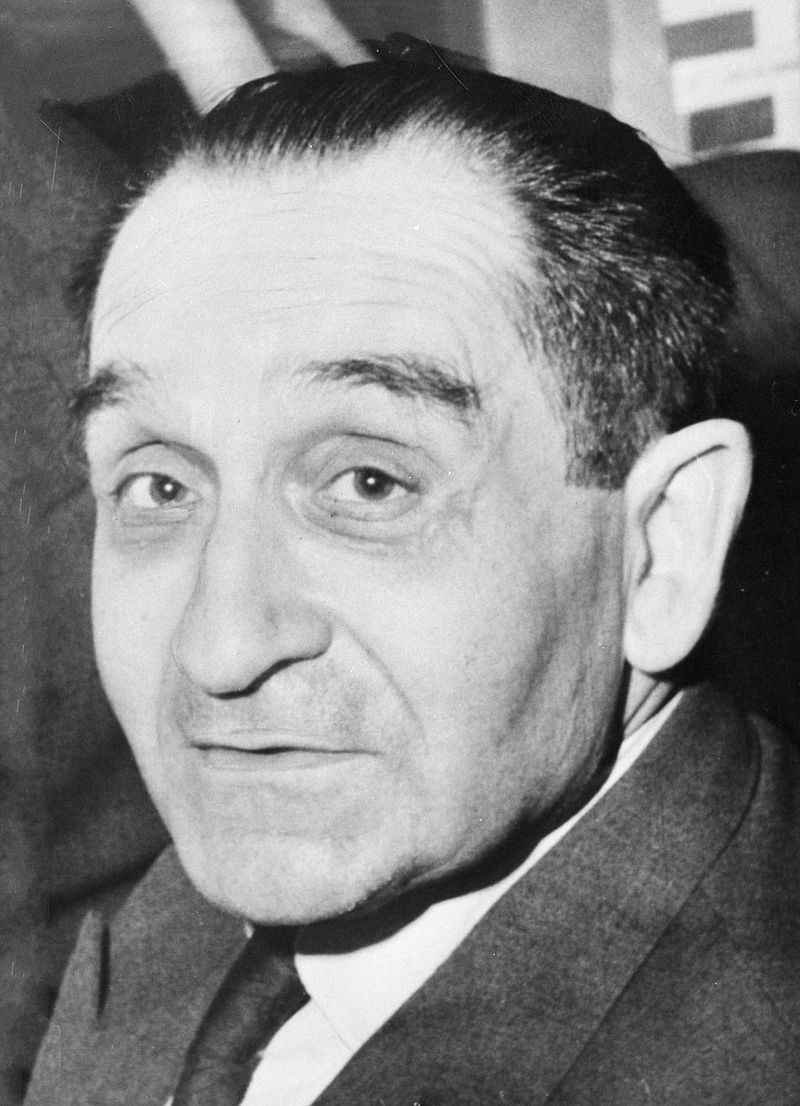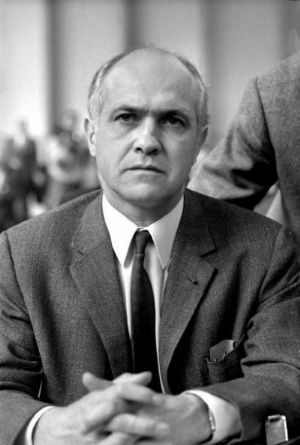<Back to Index>
- Prime Minister of France Pierre Mendès France, 1907
- Minister of National Education Alain Savary, 1918
PAGE SPONSOR


Pierre Mendès France (11 January 1907 – 18 October 1982) was a French politician who served as President of the Council of Ministers (equivalent to Prime Minister) in 1954 - 55. It was under the government of Mendès France that France withdrew its military forces from Vietnam in 1954.
Mendès France was descended from a Portuguese Jewish family that moved to France in the 16th century.
Mendès France was educated at the University of Paris, graduating
with a doctorate in law and becoming the youngest member of the Paris
Bar association in 1928. In 1924 he joined the Radical Socialist Party,
the traditional party of the French middle class center left (not to be
confused with the mainstream socialist party of the time, the SFIO).
In 1932, Mendès France was elected to the National Assembly as a deputy for the Eure département; he was the Assembly's youngest member. His ability was recognized at once, and, in the 1936 Popular Front government of Léon Blum, he was appointed Secretary of State for Finance. When World War II broke out, he joined the French Air Force. After the French surrender to Nazi Germany, he was arrested by the Vichy government authorities and sentenced to six years' imprisonment on a fallacious charge of desertion, but on 21 June 1941, he escaped and succeeded in reaching Britain, where he joined the Free French forces of Charles de Gaulle.
After serving with the Free French Air Force, Mendès France was sent by de Gaulle as his Finance Commissioner in Algeria, and then headed the French delegation to the 1944 monetary conference at Bretton Woods. When de Gaulle returned to liberated Paris in September 1944, he appointed Mendès France as Minister for National Economy in the provisional government.
But Mendès France soon fell out with the Finance Minister, René Pleven, when Mendès France favored state regulation of wages and prices to control inflation (while Pleven favored free market policies). When de Gaulle sided with Pleven, Mendès France resigned. Nonetheless, de Gaulle valued Mendès France's
abilities, and appointed him as a director of the International Bank
for Reconstruction and Development, and as French representative in the United Nations Economic and Social Council.
In 1947, when normal French politics resumed under the Fourth Republic, Mendès France was re-elected to the National Assembly. He first tried to form a government in June 1953, but was unable to gain the numbers in the Assembly. From 1950 he had been a consistent opponent of French colonialism, and, by 1954, France was becoming hopelessly embroiled in major colonial conflicts: the First Indochina War and the Algerian War of Independence. When French forces were defeated by the Vietnamese Communists at Dien Bien Phu in June 1954, the government of Joseph Laniel resigned, and Mendès France formed a government. Among his ministers was the young François Mitterrand.
Mendès France immediately negotiated an armistice with Ho Chi Minh, the Vietnamese Communist leader. There was, he said, no choice but total withdrawal from Indochina, and the Assembly supported him by 471 votes to 14. Nevertheless, nationalist opinion was shocked, and Roman Catholic opinion opposed abandoning the Vietnamese believers to Communism. A tirade of abuse, much of it anti - Semitic, was directed at Mendès France. (Mendès France is a Sephardic Portuguese name.) Jean - Marie Le Pen, then a Poujadist member of the Assembly, described his "patriotic, almost physical repulsion" for Mendès France.
Undeterred, Mendès France next came to an agreement with Habib Bourguiba, the nationalist leader in Tunisia, for the independence of that colony by 1956, and began discussions with the nationalist leaders in Morocco for a French withdrawal. He also favored concessions to the nationalists in Algeria, but the fact that there were a million Pied - noirs there meant that there could be no easy way of out that situation. The future mercenary Bob Denard was convicted in 1954 and sentenced to fourteen months of jail for an assassination attempt against Mendès France.
Mendès France hoped that the Radical Party would become the party of modernization and renewal in French politics, by-passing the SFIO. An advocate of greater European integration, he helped bring about the formation of the Western European Union, and proposed far reaching economic reform. He also favored defense co-operation with other European countries, but the National Assembly rejected the proposal for a European Defense Community, mainly because of misgivings about Germany's participation.
His cabinet fell in February 1955. In 1956 he served as Minister of State in the cabinet headed by the SFIO leader Guy Mollet, but resigned over the issue of Algeria, which was coming to dominate French politics. His split over Algeria with Edgar Faure, leader of the conservative wing of the Radical Party, led to Mendès France resigning as party leader in 1957.
Like most of the French left, Mendès France opposed de Gaulle's seizure of power in May 1958, when the mounting crisis in Algeria brought about a breakdown in the Fourth Republic system and the creation of a Fifth Republic. He led the Union of Democratic Forces, an anti - Gaullist group, but, in the November 1958 elections he lost his seat in the Assembly. In 1959 he was expelled from the Radical Party, whose majority faction supported de Gaulle.
Mendès France then joined the Unified Socialist Party (Parti Socialiste Unifié or PSU), a small party of the intellectual left. He made an unsuccessful bid to regain his seat in the National Assembly representing Eure in the 1962 election.
In 1967, he returned to the Assembly as a PSU member for the Isère, but again lost his seat in de Gaulle's 1968 landslide election victory. In accordance with the PSU, Mendès France expressed sympathy for the sentiments and actions of the student rioters during the "events" (les évènements) of May 1968, a position unusual for a politician of his age and status. In an unorthodox move, de Gaulle's socialist opponent, Gaston Defferre, had designated him Prime Minister elect prior to the election; but to no avail for either. When Mitterrand formed a new Socialist Party in 1971, Mendès France supported him, but did not attempt another political comeback.
Shortly before Mendès France died in 1982, he witnessed the coming to office of Socialist President François Mitterrand.

Alain Savary (25 April 1918, Algiers – 17 February 1988, Paris) was a French Socialist politician, deputy to the National Assembly of France during the Fourth and Fifth Republic, chairman of the Socialist Party (PS) and a government minister in the 1950s and in 1981, when he was nominated by President François Mitterrand as Minister of National Education.
In 1940, as soon as France was occupied by the German army, he enlisted in the Resistance. He organized the rallying of Saint - Pierre et Miquelon to the Free French Forces and became its governor. After the war, he participated to the restoring of the Republican State.
A member of the French Section of the Workers' International (socialist party, SFIO), he was deputy for Saint - Pierre et Miquelon throughout most of the Fourth Republic, from 1944 to 1946 and from 1951 to 1958. In 1956, he was nominated Secretary of State for Foreign Affairs in Guy Mollet's cabinet, but resigned due to his opposition to the repressive policy of Mollet in Algerian War (1954 – 62) and to the arrest of Ahmed Ben Bella. He left the SFIO in 1958, because of the party's support for Charles de Gaulle's comeback and for the new Constitution elaborating a presidential regime (the Fifth Republic).
With Pierre Mendès - France, he founded the dissident Autonomous Socialist Party
(PSA) which became, in 1960, the Unified Socialist Party (PSU).
However, he left it in 1967 and founded the Union of Clubs for the
Renewal of the Left, which joined the Federation of the Democratic and
Socialist Left (FGDS) which supported left wing candidate François
Mitterrand at the 1965 presidential election. Then, he returned to the
"old socialist house" when it was replaced by the Socialist Party (PS).
Reconciled with Guy Mollet, he succeeded him to the leadership of the party in 1969. As First Secretary of the PS, he promised to begin an "ideological dialogue" with the French Communist Party (PCF), which was the largest left wing party in France at the time. Yet, he was faced with growing pressure from internal opponents who reproached him to remain dependent on Mollet's followers and to not pursue the renewal of the party. Two years later, during the Epinay Congress, he was overthrown by François Mitterrand, who proposed an alliance with the Communists based on a Common Program.
Deputy for Haute Garonne in 1973, then Minister of National Education in 1981, he resigned three years later, after the failure of his bill to limit the financing of private schools. Indeed, in July 1984, President Mitterrand decided to withdraw the Savary Bill due to large demonstrations by the supporters of private schools.